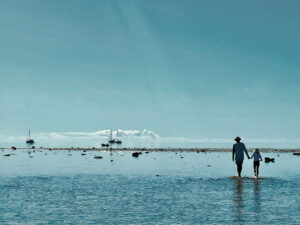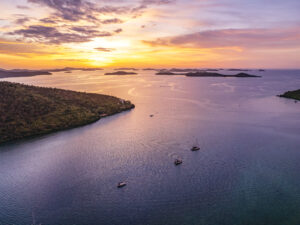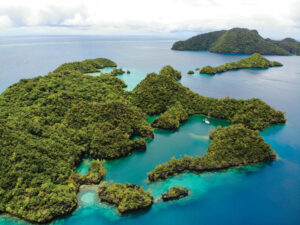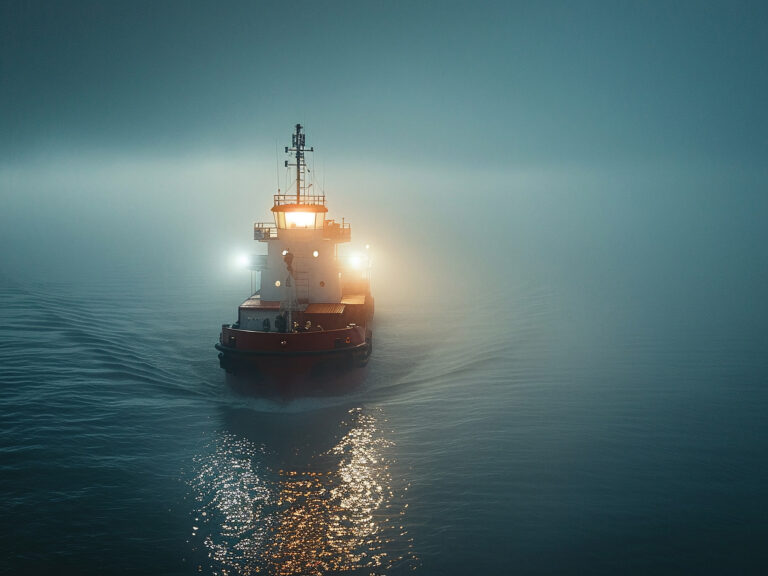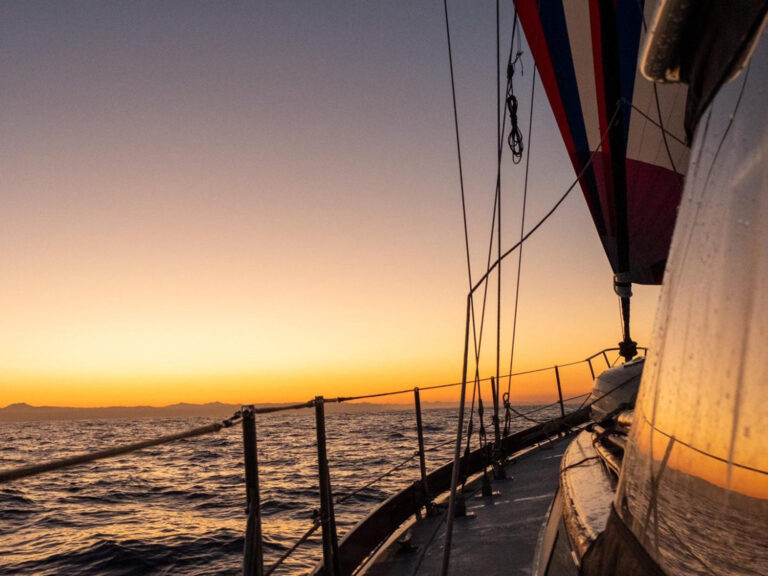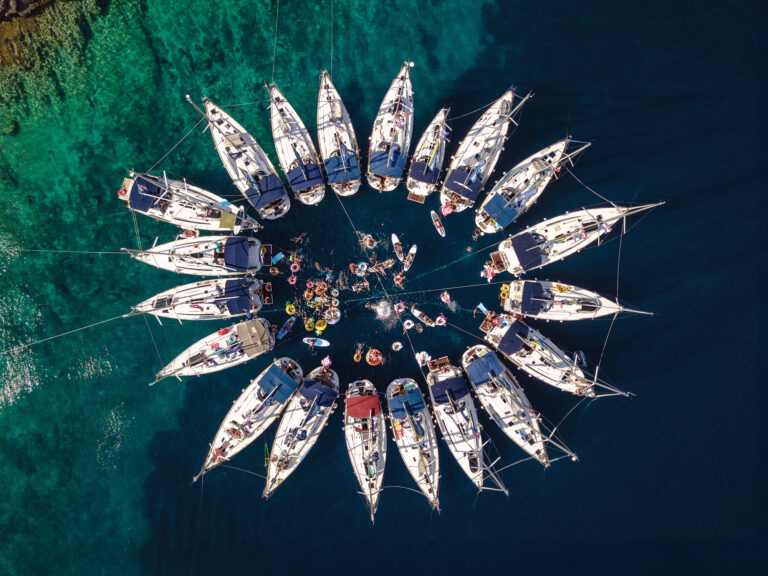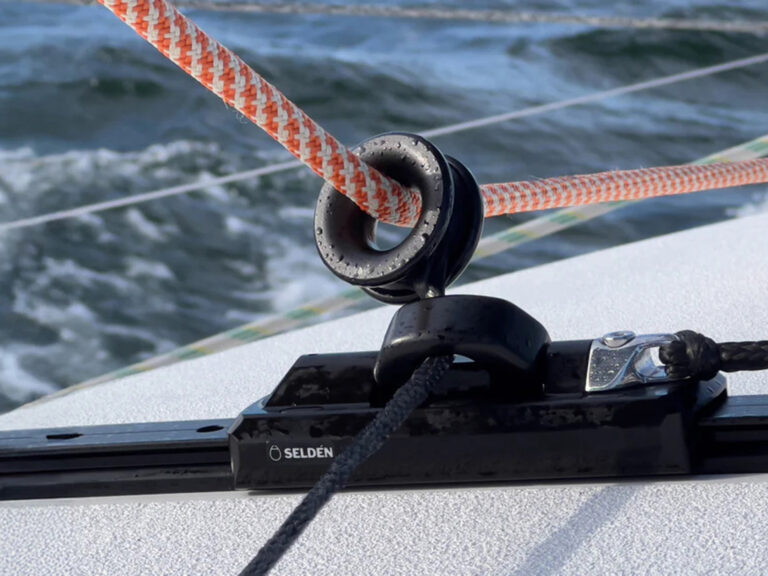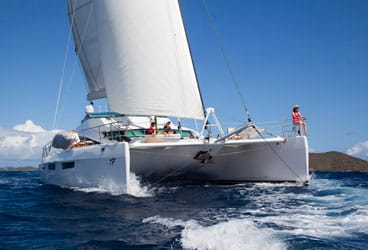
Luxury Charter Charity
After a bracing, early morning, 230-foot climb up to Fort Duvernette, just south of Young Island, off the southern tip of St. Vincent in the Windward Islands, I leap off a stern of the 75-foot luxury Privilège catamaran Matau and into the turquoise water to cool off.
Barely a whimper comes from me, yet stewardess Alice Morby hovers gently nearby, plush bath towel at the ready. Even more delectable is the proximity of shampoo, conditioner, and soap-gel dispensers installed inside the transom steps, inches, of course, from a handheld shower. Identical setups exist on both port and starboard transoms.
“Coffee?” Alice asks.
Having spent some years as chef and mate in the crewed-charter business in the Caribbean, I think I remember the routine aboard a high-end sailboat. Make breakfast and clean up. Sail, then anchor. Make lunch and clean up. Sail, then anchor. Make dinner and dessert. Clean up. Sleep.
Today a different voice rises up inside: Relax. You’re a guest.
Sunblock? Check. Swimsuit? Check. Fluffy towels and—soap-gel dispensers in the transom? Are you kidding me?
Having now ridden this self-indulgent streak to a former swab’s personal limit, I gently shoo Alice away and make my way up from the aft platform into the broad, veranda-like guest cockpit.
The beam on Matau— the name derives from a Maori expression for a highly stylized, mythologically significant carving of a fish hook—spans 36 feet, and there’s ample room in this area for a dining table, several settees, even a spiral stainless-steel staircase. At the top, out of the way of the entertainment arena, is the flybridge. At 20 feet above the waterline, it’s where the helm, the sail controls for the cutter rig, and the navigation panel are, flanked by an exposed sunbathing and lounge area that includes settees, throw pillows loaded with unobtrusive weights so they don’t fly off on a reach, a wet bar, a sink, a fridge, an icemaker, and a grill. By the end of the trip, I’d come to call this area, one that any guest might never bother to climb up to and explore, the garret apartment and tease Virginia Wagner, Matau‘s captain, and Jamie Stark, the engineer and first mate, that they should sublet the space.
But having not yet thought about anything beyond my caffeine habit, much less sailing through the gorgeous Grenadines and delivering books and school supplies to island children, I push the button that automatically parts the double glass doors and step inside the boat’s modern, elegant, air-conditioned saloon.
Before me on a dining table is the morning eye-opener: a spread of coffee, juice, hot water, cream, milk, assorted teas, breakfast cereal, and yogurt. A hot breakfast of eggs over easy, tropical fruits, bacon, and scones fit for lumberjacks is an hour off, to be served alfresco by chef Christopher Cantrell.
A Charter Broker and a Cause
Seated at the table is longtime charter-yacht broker and fellow crewmate Ann-Wallis White, dressed in her flowing, diaphanous nightgown, her hair falling in wisps from a loose bun, and studying the world from behind owl-eyed glasses.
Piled high all around her and dwarfing the spread is her inner life’s work, the yield of volunteer hours far more significant to her than early morning hikes. There are books and more books, fiction, nonfiction, and reference, for kindergartners through young adults.
From such slender donated tomes as Indians of the American Southwest by Steven L. Walker to The Super Science Book of Rocks and Soils by Robert Snedden, it’s endless. There are books everywhere, in boxes under the table, on its surface, on the settee. Hello Moon, National Velvet, A Separate Peace. Used, donated, hardbound, and paperback.
Then there are boxes of Crayola crayons—64-count cartons, with the built-in sharpener, not the little boxes. Squeezed in next to the coffee thermoses, in stacks, are colorful bundles of pencils, multicolored plastic sharpeners, teacher’s kits, Palmer-method cursive-penmanship strips, you name it. I feel the shadow of my life as a grade-schooler tugging at me once again.
“Here’s something you can do to help,” Ann says, handing me a sheet of oval stickers. “Put these on the books you think they match. Find good ones for Murray and Olin.”
I grab coffee and get to work. The labels contain book-donation details and in-memoriam tributes to various acquaintances Ann has made over the 35 years she’s worked in the crewed-yacht vacation business. I poke through the books and have fun associating certain titles with late titans of the marine industry—Desmond Nicholson, Murray Davis, Olin Stephens II. I peel off the labels and smooth them on the covers.
Ann is either talking to herself or thinking out loud, reminding herself what needs to happen today and what schools we need to visit. Out pops this: “R-E-A-D is a four-letter word. We have to find a way to save these beautiful books from the recycling bin. I do not want them turned into paper towels for 10 cents a ton. The digital age may be upon us, but the children need these books.”
She’s a flurry of energy, a force of nature. Questions, phone numbers, emotions, imagination, memories of a privileged childhood in a highly educated family, tidbits from a well-traveled life, juicy networking stratagems, commentary, opinion—it all tumbles out.
And, still sitting right where I found her a few minutes earlier, she’s going to set me straight about my priorities during our time aboard Matau.
“On this trip,” she says, “we’re having this sybaritic wonderful time, but our pastime is to give books away. Because we’re both on assignment, the kayaking and snorkeling is the work part. The crew is coddling us like eggs, and they are so good at what they do. But our fun here is to give away the books.
“Life,” she adds with a bit of a huff, “does not begin and end at the Willy T!”
Her denunciation refers, of course, to the world-renowned British Virgin Islands steel-hulled trader-turned-watering hole, where thousands of charterers (and the paid swabs supposedly chaperoning them) have made an ill-considered pit stop, giving themselves over to such pastimes as body shots. I turn away so she doesn’t see me giggle.
What a relief, the swab in me thinks. The wine lists, the huge meals, the air-conditioning, the Jacuzzi in the master cabin, the mountains of pillows and fluffy towels. Someone else is making my bed. It’s killing me. Thank God we’ll be busy.
Good Works First
Why a luxurious crewed cat that goes out for $40,000 a week is raising its waterline by leaving books behind wherever it sails becomes less of a mystery for me as my time aboard passes.
Our north-south Grenadines sailing itinerary includes stops at St. Vincent, Bequia, Mustique, the Tobago Cays, and Union Island before our final destination of Grenada. Hiking, snorkeling, kayaking, evening beach barbecues, and yes, sailing, are the trademark attractions, eminently worthy of any vacationing sailor’s pursuit.
For the record, thanks to endless patience from the four onboard sailing professionals, we do pull all that off. But Ann is correct: Shoreside visits are really at the heart of this crewed charter. The plan, she says, is to donate books during visits to island schools that need help.
In more than three decades of devotion to the Caribbean, Ann has seen the irony in the world of luxury sailing. The sharp contrast of glitzy yachts bobbing among beautiful tropical islands whose citizens struggle to make ends meet in economies dependent on tourism and vulnerable to natural disasters isn’t lost on her. On St. Vincent, where monthly income is the equivalent of about US$300 and a paperback book costs about US$12, the government has expressed support for the existence of secondary schools and efforts to have at least one member of each family attain a university-level education.
Via island contacts developed while arranging charters, she saw firsthand that reading levels of Caribbean children lag behind those of children in developed countries. So she cajoled former clients and friends and fellow brokers to donate used books. At boat shows, she’d get crews of yachts she brokered to stow a few boxes aboard when they headed south. When they’d make landfall, they’d pass on the books to teachers, taxi drivers, and friends who would then distribute them.
“The involvement of the local community is my priority,” she tells me. “I like to see local children have the opportunity. Otherwise, the disparity between what we have and what we do and what we bring here to the Caribbean is too great. The trickle down isn’t trickling down enough for me. When you see how desperate people are for a book and how easy it is for you to get one, it makes perfect sense to think about the impact that a book can have, then just stuff it in your luggage.”
The result is an ever-growing spider web of involvements and connections, which is how Ann herself describes it. Her efforts, and those of fellow Matau charter guest Karen Kelly Shea, of Nicholson Yachts of Newport, Rhode Island, are part of a loose, informal network that today includes not just crews from yachts like Matau but also cruising sailors, an organization called Books for International Goodwill, and a host of other nonprofit groups. (See “Ways to Help” below)
And this doesn’t account for all the taxi drivers, school principals, members of the clergy of various faiths, police, ship’s agents, owners of bareboat-charter companies, newspaper and magazine editors, photographers, and just about anyone and everyone else who gets “Anned” along the way. Once she explains the mission, they get involved willingly, enthusiastically, and urgently.
The reach of her book-donation projects is hardly restricted to the Windwards. From the Virgin Islands to the Leeward Islands and south to Grenada, Ann and others are relentless in efforts to donate books, help local children learn to sail, supply teachers with paper, pencils, and other sorely needed materials, and build libraries. She’s emboldened by the success stories, by the kids who sidestep the poverty, ennui, and drugs, who hungrily learn to read, and in so doing, create a better life for themselves.
Top Notch
I’m not the only one on this trip for whom the itinerary is an unpredictable, changeable work in progress. Captain Virginia and first mate Jamie, individually and together, possess enough miles and nautical credentials to preside over scores of naval fleets. The couple and Ann are longtime friends, and they’ve helped her move books aboard other boats they’ve crewed.
Specifically, Virginia holds a U.S. Coast Guard 1,600-ton ocean master’s license, and in more than 35 years and 400,000 miles, she’s commanded commercial vessels up to 158 feet devoted to navigational training, ocean sailing, and oceanographic research.
Jamie, born in the U.S. Virgin Islands, is a lifelong cruiser, a U.S. Coast Guard-licensed engineer, and holds master’s licenses in the mechanical trades. There isn’t a piece of plumbing, refrigeration, or air-conditioning on land or sea that daunts him. He protests, “I’m just a cabin boy!” Don’t believe it for a second.
As if none of this is enough, besides keeping the massive rigging and mechanical, electrical, and electronics systems of Matau in flawless, spotless working order, it turns out that Virginia and Jamie have a fun, silly, and creative side that they shower upon their guests.
From pirate treasure hunts and hat parties to rounds of Guitar Hero after dinner and Virginia’s talks about the celestial night sky, the onboard digital-photo album is bursting with fond memories of good times.
It all starts with Virginia’s one-woman photography and publishing empire, operated out of view of guests, from the saloon, where she keeps sheaves of thick paper, a printer, a laptop computer, and other materials necessary to produce individual scrapbooks, photo albums, party hats, you name it.
“My job is to show people cool stuff they’ve never seen before,” Virginia says to describe her non-boaty side. “I do things for people because I want to. I really like to combine photography and crafts and the things I do for guests with the other part of what I do to make a living, being a captain and driving the boat.”
What pros! The swab reflects. It’s a far cry from what I remember about the routine.
Caught Reading
At every school we visit in these remote, isolated Grenadian villages, the children want and need more than we have to give them. They’re so wildly jubilant and enthusiastic when we come calling with boxes of books and pencils and crayons that they practically knock us over.
In Paget Farm, they want Cinderella, Beauty and the Beast, and pencils; at Clifton, tomes on ancient history and archaeology. In Colonarie, their plea is for a basketball and net—after someone can find them something to eat, because there’s no food at home.
As our bobbing bookmobile makes landfall north to south, I’m struck dumb. These kids, little ones and teenage ones, skinny and chubby, lanky and short, have so much less than many average American kids. Heavy, dark, wooden desks and chunky chairs, long out-of-date globes on pedestals, libraries with rows and rows of empty shelves, the principal’s heavy, scary bell—that’s right, the brass bell with the long black handle—paint a portrait of threadbare education unfamiliar to our group.
Throughout the charter, Ann is always on the cellphone, with any number of her contacts on land and on boats, people who are inextricably caught up in her spider web. They await us at each anchorage and every dock, where our human chain of guests and crew, sweating, try to catch the right momentum on the swell to move boxes and bags of books and school supplies.
In St. Vincent, we get help from taxi driver Charlie Tango and the staff at Barefoot Yacht Charters. At Bequia, sailor Iris Metz, Sandra Ollivierre of Challenger Taxi, and Sally Erdle, the editor of Caribbean Compass, the monthly cruisers newspaper, escort us.
“Schools in the Caribbean have nothing,” Iris complains. Iris, with her husband, Henry, are the longtime crew of the yacht Shaitan of Tortola, based out of Bequia. Luana, their daughter, takes the ferry daily to school on St. Vincent. “Some schools are in an unthinkable position. I’m from Germany, and I can’t believe that they have no books. The children are crying when you bring them books.”
After a break for some fun in the sun on Mustique and in the Tobago Cays, we reach Union Island on a Saturday, my last charter day. Instead of hooking up with the principal and students who eagerly turn out on a weekend to say hello to Ann, thank her for books, and ask her for more, I take a walk with Karen, and we wind up in an unlikely spot for crewed-charter guests in the tropics: the living room of the priest assigned to St. Joseph’s Catholic Church, watching news of the earthquake in Haiti with him on CNN.
We turn from the world of natural disasters to those more socially pernicious. No matter the physical needs of Caribbean kids, the region’s high unemployment, St. Vincent’s role as a drug-transshipment point between South America and the rest of the world, the hurricanes, and the missing fathers, the long-term solution for the young of the West Indies resides in one underlying factor.
“Education is the key,” Father Andrew Roache says. “It brings self-motivation. It helps people think and have a vision. It’s the only way out of poverty, really.”
Acknowledging all of the challenges, Father Andrew, a native of the Grenadines who went off to Canada to get his degrees, remains optimistic. “Reading has always been a fundamental problem here,” he says. “Things are changing slowly. There seems to be a paradigm shift and a new emphasis on education.”
His goal, which he hopes to reach via community-outreach programs, is to be part of the dawn of a new age. “How do you get people to develop a love of reading?” he asks. “You must start young. I see young people reading; it has to be a holistic effort, with everyone working together. My new slogan for the children is ‘Get caught reading,’ to encourage a shift from drug use.”
Hot, dusty, and near-bursting with a jumble of emotions, I’m beat, but the crew is hard at it yet. They retrieve us and ferry us back to Matau. We’re served drinks, and Alice has once again set the table in a subtle, elegant nautical décor of seashells, linens, and woven placemats. In no time, we’re sipping Chris’ version of the traditional Caribbean soup called rundown, a luscious elevation of the boiled-down blend of coconut milk, callaloo, and breadfruit. It’s a night of soothing breezes, lively discussion, and tasty and elaborate fare.
I bid all my mates—guest and crew—good night and return to my cabin for reading and rest. Keeping safe the page where I’d last put my book aside is a hand-made bookmark with tassel, deposited at our bedsides when we first arrived.
On one side is printed the name of the boat, Matau. On the other, Virginia, one-woman wonder of the seas and publishing house, has again worked her magic. Via words and reading, she’s taught me cool stuff that I’d never known. In tiny print, the bookmark she’d made contains the story behind the word matau.
“The fishhook shape of the Hei Matau,” I read, just before I began to nod off, “finds its origins in Maori legend that the North Island of New Zealand was once a huge fish. . . .”
Ways to Help
These are some of the people and groups who work together in many ways to help raise literacy rates throughout the Caribbean islands. To donate books and other materials, contact charter-yacht consultant Ann-Wallis White (Annapolis, Maryland; awwyc@comcast.net); Karen Kelly Shea of Nicholson Yachts (Newport, Rhode Island; newport@nicholsonyachts.com); Boaters for Books (www.boatersforbooks.org); Hands Across the Sea (www.handsacrossthesea.net); Father Andrew Roache (frandrew@vincysurf.com), the pastor of St. Joseph’s Catholic Church in Clifton, on Union Island; the Mount Airy Young Readers Program, on Grenada (Doris@isle-escape.com); and the Carriacou Children’s Education Fund (ccefinfo@gmail.com).
Crewed-Yacht Charters
For details about sailing Matau or other boats in the Caribbean or in other cruising grounds, visit the Cruising World website to consult the charter directory (www.cruisingworld.com/charter-directory), which includes listings of companies and brokers such as Ann-WallisWhite.

